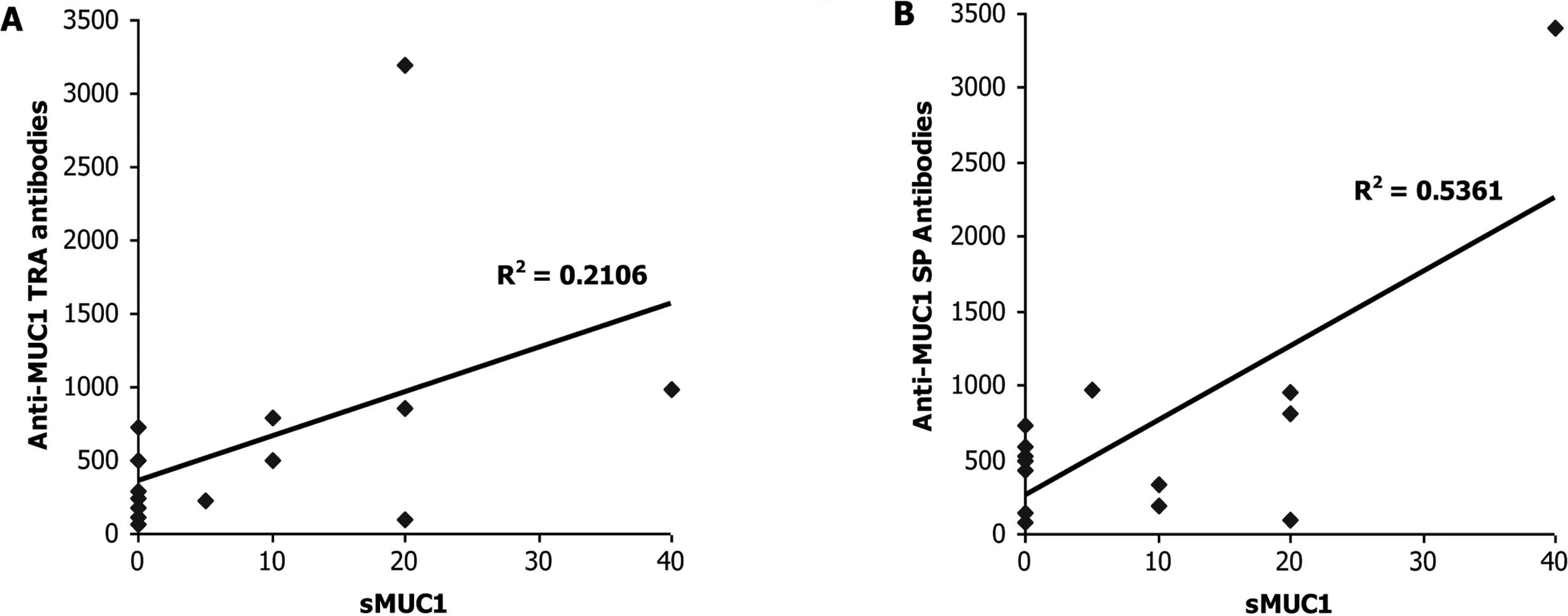|
1.
|
Croce MV, Isla-Larrain MT, Demichelis SO,
Gori JR, Price MR and Segal-Eiras A: Tissue and serum MUC1 mucin
detection in breast cancer patients. Breast Cancer Res Treat.
81:195–207. 2003. View Article : Google Scholar : PubMed/NCBI
|
|
2.
|
Luminari S, Goldaniga M, Ceccherelli F,
Guffanti A, Bombardieri E, Marcheselli R, et al: Prevalence and
prognostic significance of sMUC-1 levels in plasma cell dyscrasias.
Br J Haematol. 121:772–774. 2003. View Article : Google Scholar : PubMed/NCBI
|
|
3.
|
Treon SP, Maimonis P, Bua D, Young G, Raje
N, Mollick J, et al: Elevated soluble MUC1 levels and decreased
anti-MUC1 antibody levels in patients with multiple myeloma. Blood.
96:3147–3153. 2000.PubMed/NCBI
|
|
4.
|
Reddish MA, MacLean GD, Poppema S, Berg A
and Longenecker BM: Pre-immunotherapy serum CA27.29 (MUC-1) mucin
level and CD69+ lymphocytes correlate with effects of
Theratope sialyl-Tn-KLH cancer vaccine in active specific immuno
therapy. Cancer Immunol Immunother. 42:303–309. 1996. View Article : Google Scholar : PubMed/NCBI
|
|
5.
|
Gion M, Mione R, Leon AE and Dittadi R:
Comparison of the diagnostic accuracy of CA27.29 and CA15.3 in
primary breast cancer. Clin Chem. 45:630–637. 1999.
|
|
6.
|
Lu H, Goodell V and Disis ML: Humoral
immunity directed against tumor-associated antigens as potential
biomarkers for the early diagnosis of cancer. J Proteome Res.
7:1388–1394. 2008. View Article : Google Scholar : PubMed/NCBI
|
|
7.
|
MacLean GD, Reddish MA, Koganty RR and
Longenecker BM: Antibodies against mucin-associated sialyl-Tn
epitopes correlate with survival of metastatic adenocarcinoma
patients undergoing active specific immunotherapy with synthetic
STn vaccine. J Immunother Emphasis Tumor Immunol. 19:59–68. 1996.
View Article : Google Scholar
|
|
8.
|
Brossart P, Heinrich KS, Stuhler G, Behnke
L, Reichardt VL, Stevanovic S, et al: Identification of
HLA-A2-restricted T-cell epitopes derived from the MUC1 tumor
antigen for broadly applicable vaccine therapies. Blood.
93:4309–4317. 1999.PubMed/NCBI
|
|
9.
|
Carmon L, El-Shami KM, Paz A, Pascolo S,
Tzehoval E, Tirosh B, et al: Novel breast-tumor-associated
MUC1-derived peptides: characterization in Db-/- x beta2
microglobulin (beta2m) null mice transgenic for a chimeric
HLA-A2.1/Db-beta2 micro-globulin single chain. Int J Cancer.
85:391–397. 2000. View Article : Google Scholar
|
|
10.
|
Kovjazin R, Volovitz I, Kundel Y,
Rosenbaum E, Medalia G, Horn G, et al: ImMucin: a novel therapeutic
vaccine with promiscuous MHC binding for the treatment of
MUC1-expressing tumors. Vaccine. 29:4676–4686. 2011. View Article : Google Scholar : PubMed/NCBI
|
|
11.
|
Singh H and Raghava GP: ProPred:
prediction of HLA-DR binding sites. Bioinformatics. 17:1236–1237.
2001. View Article : Google Scholar : PubMed/NCBI
|
|
12.
|
Vita R, Zarebski L, Greenbaum JA, Emami H,
Hoof I, Salimi N, et al: The immune epitope database 2.0. Nucleic
Acids Res. 38:D854–D862. 2010. View Article : Google Scholar : PubMed/NCBI
|
|
13.
|
Kolaskar AS and Tongaonkar PC: A
semi-empirical method for prediction of antigenic determinants on
protein antigens. FEBS Lett. 276:172–174. 1990. View Article : Google Scholar : PubMed/NCBI
|
|
14.
|
Horn G, Gaziel A, Wreschner DH,
Smorodinsky NI and Ehrlich M: ERK and PI3K regulate different
aspects of the epithelial to mesenchymal transition of mammary
tumor cells induced by truncated MUC1. Exp Cell Res. 315:1490–1504.
2009. View Article : Google Scholar : PubMed/NCBI
|
|
15.
|
Keydar I, Chou CS, Hareuveni M, Tsarfaty
I, Sahar E, Selzer G, et al: Production and characterization of
monoclonal antibodies identifying breast tumor-associated antigens.
Proc Natl Acad Sci USA. 86:1362–1366. 1989. View Article : Google Scholar : PubMed/NCBI
|
|
16.
|
Palmer M, Parker J, Modi S, Butts C,
Smylie M, Meikle A, et al: Phase I study of the BLP25 (MUC1
peptide) liposomal vaccine for active specific immunotherapy in
stage IIIB/IV non-small cell lung cancer. Clin Lung Cancer.
3:49–58. 2001. View Article : Google Scholar : PubMed/NCBI
|
|
17.
|
Sangha R and North S: L-BLP25: a
MUC1-targeted peptide vaccine therapy in prostate cancer. Expert
Opin Biol Ther. 7:1723–1730. 2007. View Article : Google Scholar : PubMed/NCBI
|
|
18.
|
Kovjazin R, Volovitz I, Daon Y,
Vider-Shalit T, Azran R, Tsaban L, et al: Signal peptides and
trans-membrane regions are broadly immunogenic and have high
CD8+ T cell epitope densities: implications for vaccine
development. Mol Immunol. 48:1009–1018. 2011. View Article : Google Scholar : PubMed/NCBI
|
|
19.
|
Apostolopoulos V and McKenzie IF: Cellular
mucins: targets for immunotherapy. Crit Rev Immunol. 14:293–309.
1994. View Article : Google Scholar : PubMed/NCBI
|
|
20.
|
Graham RA, Burchell JM and
Taylor-Papadimitriou J: The polymorphic epithelial mucin: potential
as an immunogen for a cancer vaccine. Cancer Immunol Immunother.
42:71–80. 1996. View Article : Google Scholar : PubMed/NCBI
|
|
21.
|
Ho SB, Niehans GA, Lyftogt C, Yan PS,
Cherwitz DL, Gum ET, et al: Heterogeneity of mucin gene expression
in normal and neoplastic tissues. Cancer Res. 53:641–651.
1993.PubMed/NCBI
|
|
22.
|
Tang CK, Katsara M and Apostolopoulos V:
Strategies used for MUC1 immunotherapy: human clinical studies.
Expert Rev Vaccines. 7:963–975. 2008. View Article : Google Scholar : PubMed/NCBI
|
|
23.
|
Baty D and Lazdunski C: An anti-(signal
peptide) antibody: purification, properties and use as a
conformational probe. Eur J Biochem. 102:503–507. 1979. View Article : Google Scholar : PubMed/NCBI
|
|
24.
|
Harboe M, Whelan AO, Ulvund G, McNair J,
Pollock JM, Hewinson RG, et al: Generation of antibodies to the
signal peptide of the MPT83 lipoprotein of Mycobacterium
tuberculosis. Scand J Immunol. 55:82–87. 2002. View Article : Google Scholar : PubMed/NCBI
|















